There could soon be a ban on microbeads, British MPs have warned, especially if cosmetic firms fail to ‘clean up their act’. The cross-party Environmental Audit Committee has warned of increasing damage being done to marine life around British waters and beyond. Humans could eventually be affected too, Committee members warned.
Microbeads are tiny microspheres – ultra-tiny beads – usually made of polyethylene, and sometimes also polypropylene and polystyrene. They are extensively used as exfoliating agents in cosmetics, in health science research, as well as personal care products such as toothpaste.
Microbeads from personal care products invariably end up in the sea. Their journey begins when they are washed down the drain and pass unfiltered through sewage treatment plants – they are too small for filters to catch – ending up in canals, rivers and the sea.
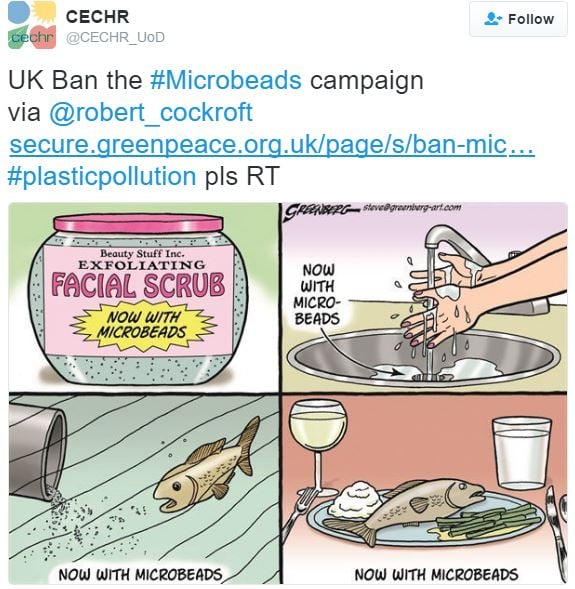 CECHR (Centre for Environmental Change and Human Resilience), based at Dundee University, warns that the microbeads we dump in the sea end up back on our dinner plate! (Image: twitter.com/CECHR_UoD)
CECHR (Centre for Environmental Change and Human Resilience), based at Dundee University, warns that the microbeads we dump in the sea end up back on our dinner plate! (Image: twitter.com/CECHR_UoD)
Microbeads pollute our seas in a big way
They can stay in the sea for up to fifty years, and accumulate into higher and higher concentrations.
Tens of billions of these tiny plastic beads end up in our oceans on a daily basis across the world. Today they represent a serious threat to marine life in general, and especially for the survival status of many endangered species.
All our oceans are already filled with literally hundreds of millions of tons of plastic – and we are still using our seas as giant dumping grounds. When the plastic breaks up into microscopic pieces, it and the microbeads end up in the stomachs of marine wildlife, including seabirds, whales, fishes, turtles, zooplankton, mussels, seals, oysters, and hundreds of other species.
Experts warn that the problem will eventually come and bite us on the backside – especially when most of the fish we eat becomes contaminated with microbeads and other plastic fragments. We will have more and more plastic inside us!
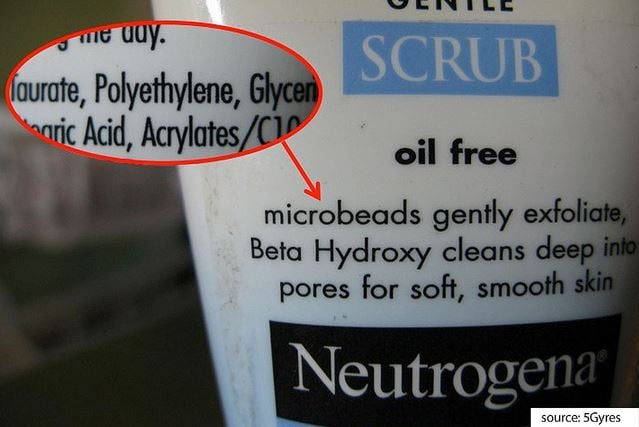 Hundreds of products consumers buy everyday have seemingly harmless microbeads in them. These tiny plastic beads are polluting our seas and destroying marine life. (Image: beatthemicrobead.org)
Hundreds of products consumers buy everyday have seemingly harmless microbeads in them. These tiny plastic beads are polluting our seas and destroying marine life. (Image: beatthemicrobead.org)
According to a report just released to the UK government, between 16 and 86 tons of microbeads are washed into the sea each year – and that is just what Britain dumps into the ocean.
Fish in UK waters contaminated
According to one study, over one third (36.5%) of fish in the English Channel are contaminated with microplastic particles, which suggests that the problem is considerably greater than previously realised.
Mary Creagh, a Labour MP representing Wakefield, who is also the Chair of the Environmental Audit Committee, said regarding the new report:
“This paper raises important questions about the damage microplastics could be doing to our marine environment. We know shellfish and fish are ingesting plastic fragments, what we don’t know is the effect this is having on them and on human health.”
“The most effective way to reduce microplastic pollution is to prevent plastic entering our waters in the first place. Cosmetic companies need to clean up their act and phase out the plastic microbeads causing marine pollution. If they refuse to act, the Environmental Audit Committee will consider calling for a full ban on microbeads.”
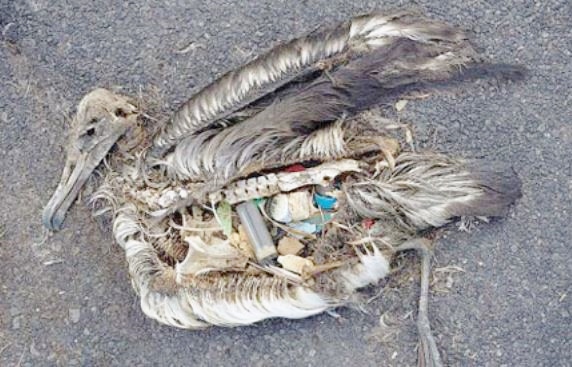 Marine biologists, ecologists and conservationists are shocked at what is being found in the stomachs of some birds. (Image: seawatchfoundation.org.uk)
Marine biologists, ecologists and conservationists are shocked at what is being found in the stomachs of some birds. (Image: seawatchfoundation.org.uk)
Baby fish love eating microplastic particles
A new study published earlier this week revealed that larval fish (baby fish) adore microplastic particles – in fact, when given the chance that is all they want to eat, and not natural free-swiiming zooplankton, their natural food source.
Scientists from Uppsala University in Sweden said these tiny particles stunt larval fish growth and raise mortality rates considerably.
A microplastic particle is one that is less than 5mm in size. They come from plastic waste products that break up into smaller and smaller fragments, or from microbeads.
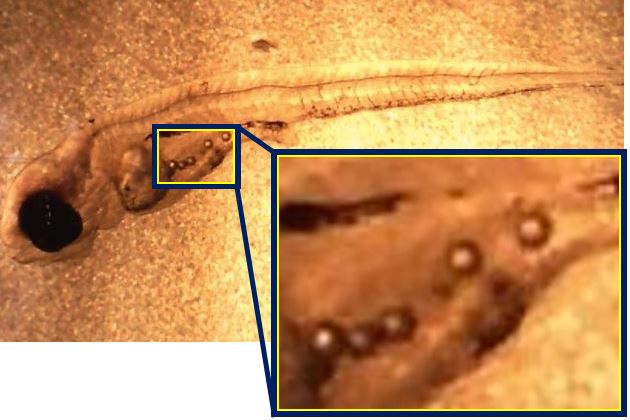 Baby fish with microplastic particles inside its gut. Swedish scientists said the fishes preferred microplastics instead of natural food. (Image: uu.se. Credit: Oona Lönnstedt)
Baby fish with microplastic particles inside its gut. Swedish scientists said the fishes preferred microplastics instead of natural food. (Image: uu.se. Credit: Oona Lönnstedt)
Marine biologists and ecologists across the world are becoming increasingly alarmed at the colossal amount of plastic we have dumped into our oceans. They fear there is much worse news to come, given that every single study now seems to warn of serious problems today and greater complications tomorrow.
Lead author in the Swedish study, Dr. Oona M. Lönnstedt, said:
“Fish reared in different concentrations of microplastic particles have reduced hatching rates and display abnormal behaviors. The microplastic particle levels tested in the current study are similar to what is found in many coastal habitats in Sweden and elsewhere in the world today.”
Juvenile fishes that had been exposed to microplastic particles were significantly less active than the control fish (fish reared in plastic-free water). They did not react to the smell of predators or try to get out of their way.
Contaminated perch and control perch were placed together with pike – a natural predator. The fish with plastic inside them were caught and eaten four times faster than the control fishes. In fact, in the tank with plastic in it, all the fishes were caught and eaten within 48 hours.
Scientists are worried that higher mortality rates, stunted growth and other problems seen in fish contaminated with microplastic will significantly undermine their ability to reproduce and maintain populations across the world.
Great summary of the #microbead issue: https://t.co/INDwOkeUHj Seriously, there are microbeads in your toothpaste. #48DayofBlue
— Jim Wharton (@jimwharton) June 2, 2016
Britons support banning microbeads
A Greenpeace survey that was published in April showed that the vast majority of people in the UK support banning the use of microbeads. More than 90% of respondents favoured a ban.
The survey authors also informed that 64% of Britons would be put off buying from a company if they found out that it was extensively polluting our oceans.
Greenpeace says more than one-quarter of a million people have signed a petition urging Prime Minister David Cameron to push for a ban microbeads.
If the Americans have done it, why can’t we, says Greenpeace UK. Last year, US President Barack Obama signed legislation to ban microbeads used in personal care products – the new law will come into force in 2017. Canada is about to implement similar legislation.
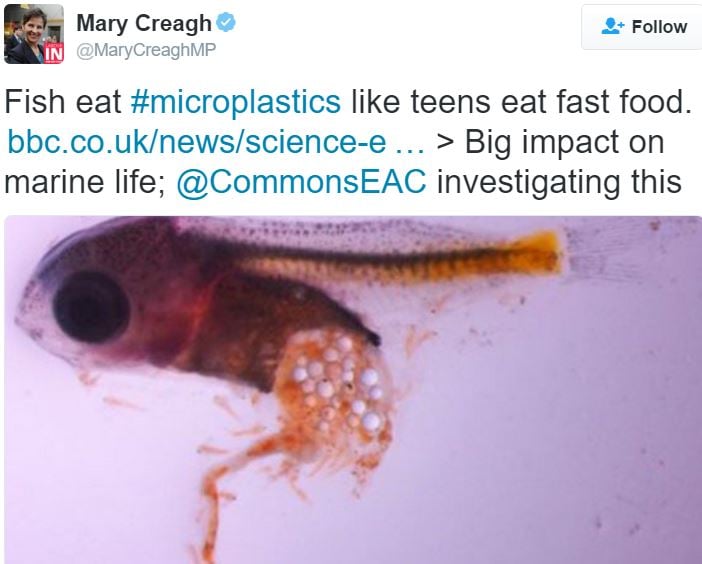 Chair of the Environmental Audit Committee, Mary Creagh MP, tweeted this image on 3 June, showing a larval fish with microplastic particles inside it. (Image: twitter.com/MaryCreaghMP)
Chair of the Environmental Audit Committee, Mary Creagh MP, tweeted this image on 3 June, showing a larval fish with microplastic particles inside it. (Image: twitter.com/MaryCreaghMP)
Not a hard problem to solve
Greenpeace UK oceans campaigner, Louise Edge said regarding the survey:
“These results show clearly that a vast majority of U.K. consumers are concerned that the personal care products they buy are causing millions of microplastics to flush down our drains and out into our marine ecosystems.”
“Microbeads are one of those rare environmental problems that are actually relatively easy to solve. A ban is easy to introduce and alternatives are already available. Although it would not alone eradicate the problems caused by microplastics, it would set an important precedent in the U.K. that pumping plastics into our oceans is not acceptable.”
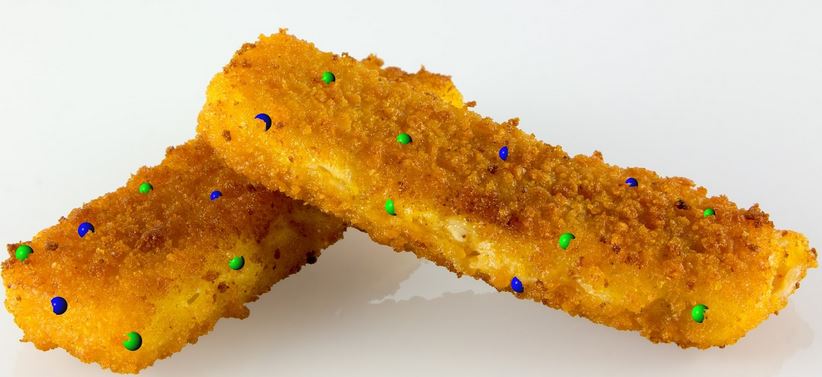 When our children start eating microbead-laden fish fingers, will they have the same problems baby fish have? Will they be less active, suffer from stunted growth, and walk straight into oncoming traffic when crossing the road (equivalent of baby fish swimming straight to predators instead of trying to hide from them)? (Image: http://ecopolproject.blogspot.mx)
When our children start eating microbead-laden fish fingers, will they have the same problems baby fish have? Will they be less active, suffer from stunted growth, and walk straight into oncoming traffic when crossing the road (equivalent of baby fish swimming straight to predators instead of trying to hide from them)? (Image: http://ecopolproject.blogspot.mx)
Want to know which firms stopped using microbeads?
If you want to know which companies are pledging to stop using microbeads in their products, go to beatthemicrobead.org, where you can also check your personal care products and toothpaste for the use of microbeads.
Beat the Microbead says:
“Each recommended dollop for face wash can cause over 150,000 plastic beads to flood into the ocean. Chemist Sherri Mason found that an average bottle of face wash can contain around 1.4 million microbeads.”
“Do not think you are safe from microbeads if you do not use an exfoliant face wash, they could very well be present in your toothpaste and body wash as well.”
Video – Law signed by President Obama bans microbeads
In December 2015, environmentalists applauded a new law signed by US President Obama outlawing microbeads that are used in personal care products. The bill – the Microbead-free Waters Act – passed Congress with bipartisan support.
